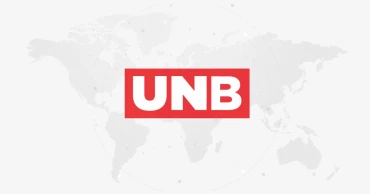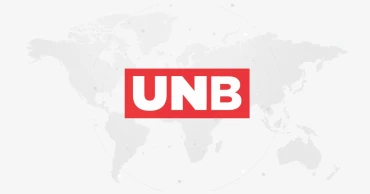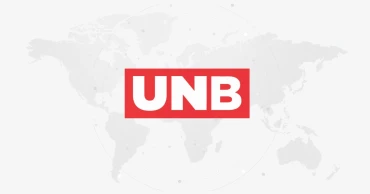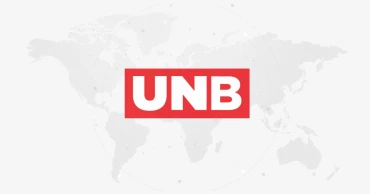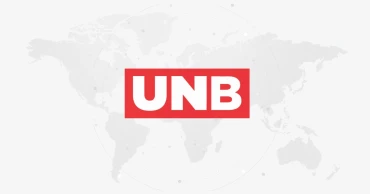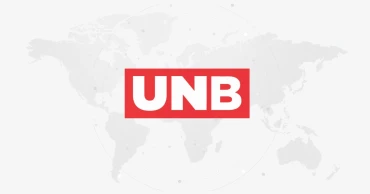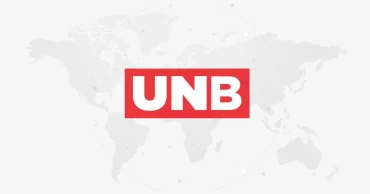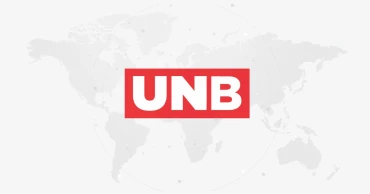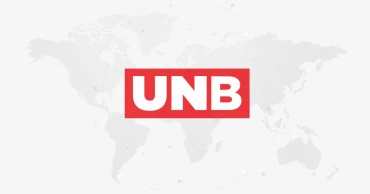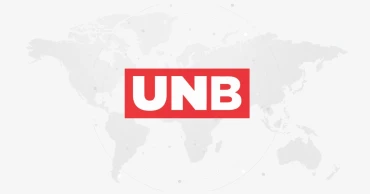Foreign-Affairs
BSF hands over body of Bangladeshi youth to BGB
Indian Border Security Force handed over the body of a Bangladeshi youth, who was gunned down by them for intrusion last Tuesday, to Border Guard Bangladesh (BGB) through Chapainawabganj’s Gomastapur border on Thursday night.
The deceased was identified as Saiful Islam, 32, a resident of Chapainawabganj district.
Naib Subedar Azad Rahman, commander of the BGB-16 Battalion in Rokanpur BOP, confirmed the matter saying that they received the body from the BSF after a flag meeting on company commander level between the countries’ frontier forces on Thursday night.
Police personnel and local representatives from both countries were present during the handing over of the body, he said.
Gomastapur police station’s Officer-in-Charge Chowdhury Jobayer Ahmed said they handed over the body to the family the same night.
It may be mentioned, the BSF members opened fire at some Bangladeshis who allegedly intruded into Indian territory to bring cattle through Rokanpur border in the Gomastapur upazila on Tuesday night.
Saiful reportedly died from the firing.
Indian MEA Spokesman affirms ‘strong and deep’ relationship with Bangladesh in response to ‘India Out’ campaign
India has reaffirmed the strength and depth of its relationship with Bangladesh, characterizing the bilateral ties as robust and multifaceted.
This statement was made by Randhir Jaiswal, Spokesperson at the Indian Ministry of External Affairs, in response to inquiries about the "India out campaign."
"India and Bangladesh relations are very strong and deep," he said in a weekly briefing in New Delhi on Thursday.
Jaiswal highlighted the comprehensive nature of the India-Bangladesh partnership, noting its extensive coverage across various sectors including the economy, investment, development, connectivity, and people-to-people exchanges
.PM Hasina likely to travel to India and China in first bilateral visits since forming new govt
"You name any human endeavor, it is part and parcel of India-Bangladesh relations," he stated.
India congratulates Bangladesh, its people
Further emphasizing the dynamism of the partnership, the spokesperson remarked, "It shows how vibrant the partnership is, and it will continue to be so."
India to help Bangladesh in importing hydropower from Bhutan: Hasan Mahmud
Hope western world will stop supplying arms to Israel: Foreign Minister
Foreign Minister Hasan Mahmud on Thursday hoped that those who supply weapons to Israel, used for killing innocent people, will realise their wrongdoing and stop the arms supply.
“We expect the Western world will realise and take steps against Israel. We, the government led by Prime Minister Sheikh Hasina, were beside Palestinians, we are with them, and we will continue to stand beside them,” he told reporters, reacting to the Israeli air strike on aid workers in Gaza that also killed three British citizens.
The Foreign Minister said that people, including innocent children and women, are being killed in Gaza with the armes supplied by the western countries.
“Even, aid workers are being killed. This is something beyond imagination. We expect arms supply to Israel will be stopped," Hasan said.
He said brutality and killings continue in Gaza by the Israeli forces who are not even taking the UN resolution into consideration.
Israeli airstrikes that killed seven aid workers in Gaza reverberated around the world, as friends and relatives mourned the losses of those who were delivering food to besieged Palestinians with the charity, World Central Kitchen.
Among those killed were three British nationals, an Australian, a Polish citizen, an American-Canadian, and a Palestinian. Some had traveled the world, participating in aid efforts in the aftermath of wars, earthquakes and wildfires.
Prime Minister Sheikh Hasina has recently written to President of the State of Palestine, Mahmoud Abbas, and reiterated her pledge to support his endeavors in obtaining full membership of Palestine in the United Nations through advocacy in all international forums and beyond.
“I restate our call for a long term ceasefire and urge all concerned to exercise restraint to protect civilian lives and infrastructure,” PM Hasina said in her letter.
Upholding justice, peace and harmony is a core teaching of Islam and all great religions, Hasina said, adding that it is what they consider an antidote to all conflicts and sufferings.
She conveyed her sincerest condolences to the government and brotherly people of Palestine for the tragic loss of innocent lives including children, women and men during the unabated Israel's genocide in Gaza and west Bank since 08 October 2023.
“I acknowledge the receipt of your letter addressed to me delivered through your envoy and General Secretary of Fatah Central Committee on 19 March 2024. I am aware of the Israeli Prime Minister's ‘Day After’ post war plan for Gaza and endorse your grave concerns over it,” Hasina said.
The plan is contempt to the rights of the Palestinian people and violation of the International Law and Accords, the letter reads.
“It is disappointing to see that the plan fails to provide any tangible pathway to this protracted conflict. Rather, it aims at suppressing the legitimate national aspirations of the Palestinians in Gaza while perpetuating Israeli control over the land,” Hasina wrote in her letter.
As a nation which has suffered occupation, and genocide, Hasina said, Bangladesh truly understands the plight of the occupied and persecuted Palestinians.
“Thus, we extend our full solidarity with the people of Palestine on international platforms, condemning the Israeli occupation and advocating for a just resolution based on international law,” the Prime Minister said.
“As Muslim brothers, we would continue to remain committed and steadfast in our support to your legitimate aspiration for independent statehood along the 1967 borders with East Jerusalem as its capital,” she added.
Foreign Minister discusses visa issuance and air connectivity with Bahrain’s ambassador-designate
Foreign Minister Hasan Mahmud has discussed the reissuance of visas for Bangladeshi expatriates' family members stranded in Bangladesh due to the Covid-19 pandemic, seeking Bahrain's cooperation to reunite them with their families in Bahrain.
This discussion took place on Wednesday, during a meeting with Bahrain's new Ambassador-designate to Bangladesh, Abdul Rahman Mohamed Al Gaoud, who is based in New Delhi.
The Ambassador highlighted the contributions of Bangladeshi expatriates in Bahrain, acknowledging their diligence and positive impact on various sectors, notwithstanding minor legal infractions by a few individuals.
Brazilian FM to visit Bangladesh on April 7-8; 4 cooperation documents likely to be signed
Ambassador Al Gaoud is poised to present his credentials to the President, symbolising the commencement of his diplomatic tenure in Bangladesh.
A significant topic during the conversation was the potential enhancement of direct air connectivity between Chattogram, Bangladesh, and Manama, Bahrain.
The Foreign Minister proposed that Gulf Airlines could operate additional flights between these cities to foster stronger people-to-people ties. The Ambassador-designate welcomed this suggestion and requested further assistance to increase flight frequencies.
Describing the relationship between Bangladesh and Bahrain as excellent, the Foreign Minister expressed optimism for expanding cooperation across various sectors, including trade, manpower employment, culture, and education, during Al Gaoud's tenure. He also extended gratitude to Bahrain for accommodating numerous Bangladeshi workers, who play a vital role in the economic development of both nations.
Death toll of Bangladeshis along border comes down: FM
Ambassador-designate Al Gaoud reciprocated the sentiments, expressing eagerness to deepen economic ties and bilateral relations between Bahrain and Bangladesh. The discussions also touched upon enhancing trade and investment avenues.
In a move signaling Bahrain's intent to bolster business and cultural exchanges, the Ambassador informed the Minister about Bahrain's plans to establish a diplomatic mission in Dhaka.
Additionally, Ambassador Al Gaoud met with Foreign Secretary Masud bin Momen to further discuss bilateral interests and collaborative opportunities.
PM Hasina likely to travel to India and China in first bilateral visits since forming new govt
Prime Minister Sheikh Hasina is set to embark on bilateral visits to New Delhi and Beijing within the next three months, marking her first such engagements after the January 7 national election. These visits are aimed at deepening Bangladesh's connections with India and China, Asia's two leading economic powers.
Following the formation of the new government, Prime Minister Hasina attended the Munich Security Conference in Germany in February, highlighting her active engagement on the global stage.
Diplomatic sources indicate that PM Hasina's visit to India is planned after the conclusion of the neighbouring country’s national election, which is the world's largest democratic exercise, spanning seven phases from April 19 to June 1, with the vote count set for June 4.
Read more: Foreign Minister discusses visa issuance and air connectivity with Bahrain’s ambassador-designate
Pre-election surveys suggest a strong showing for the coalition led by Indian Prime Minister Narendra Modi, who is widely anticipated to secure re-election.
"Prime Minister's (Sheikh Hasina) India visit will definitely take place. However, it will take place after the election in India," Foreign Minister Hasan Mahmud said.
He said it is not yet discussed at the official level when the visit will exactly take place.
In January, Prime Minister Modi extended warm congratulations to PM Hasina on her electoral victory, expressing hopes for the continued strengthening of the historically close ties between India and Bangladesh.
The last bilateral engagement between PM Modi and PM Hasina occurred during the G-20 Leaders Summit in September 2023, where Bangladesh was the guest country.
PM Hasina pays tribute to Father of the Nation on Independence Day
PM Modi is expected to extend invitations to South Asian and BIMSTEC country leaders for his swearing-in ceremony, fostering regional cooperation.
Additionally, PM Hasina's forthcoming visit to China in July was underscored during a meeting with Chinese Ambassador Yao Wen, who reiterated China's commitment to boosting investment in Bangladesh and enhancing bilateral relations.
Ambassador Yao emphasised the significance of the visit in promoting trade, investment, and cultural exchange, aligning with Bangladesh's aspirations for "Vision 2041" and the realisation of a "Smart Bangladesh."
PM Hasina wants Russian Rosatom to build another nuclear power plant at Rooppur
Hasan Mahmud seeks Portugal’s support in securing EU’s GSP+ trade preferences beyond 2029
Foreign Minister Hasan Mahmud has sought Portugal’s support in securing European Union's (EU’s) GSP+ trade preferences for Bangladesh beyond 2029.
He made the request when new Ambassador-designate of Portugal to Bangladesh (resident in New Delhi) Joao Ribeiro de Almeida met him at the Ministry of Foreign Affairs.
The Portuguese Ambassador-designate assured his government’s support in this regard and proposed direct maritime connectivity between Chattogram Port of Bangladesh and Leixoes Port of Portugal for further promoting bilateral trade between the two countries.
The Foreign Minister conveyed that Bangladesh government plans to generate 40% of its electricity from renewable sources and encouraged Portuguese investment and expertise in renewable energy sector, particularly generation of electricity from solar, wind and waves.
Brazilian FM to visit Bangladesh on April 7-8; 4 cooperation documents likely to be signed
The Portuese Ambassador-designate informed that major share of their electricity comes from renewable sources, mainly solar and wind, and it would reach the target of 80% by 2030.
He expressed Portugal’s interest in exploring collaboration with Bangladesh in renewable energy sector.
The Portuguese Ambassador-designate highly praised the Bangladesh community living in Portugal and acknowledged their active contribution to their economy.
The Foreign Minister encouraged opening of a full-fledged diplomatic mission of Portugal in Dhaka to further promote businesses and people-to-people connectivity.
He further suggested strengthening of ties by concluding an instrument on migration and mobility between the two governments.
The Portuguese Ambassador-designate agreed to explore opening a consulate in Dhaka at an early date and start discussion on a bilateral migration and mobility instrument to facilitate skilled migration from Bangladesh to Portugal.
Unlocking Chinese Heritage: Foreign Journalists in China experience art of seal cutting
Foreign journalists from the Asia-Pacific, Eurasia, Arab, Central, and Eastern Europe regions gained hands-on experience with Chinese seal cutting, a unique form of Chinese art.
Originated in China and later spreading across East Asia, seal cutting, also known as seal engraving refers to cutting a design into the bottom face of the seal.
China International Press Communication Centre, an initiative of the China Public Diplomacy Association, organised a programme 'Introduction to the Traditional Culture' in Beijing.
In 2009, Chinese seal cutting was inscribed on the list of world intangible cultural heritage.
Chanthey Roeurn, a Combodian journalist who is the Editor in chief of Economic and Business of DAP news, told UNB that he had no experience in this field, but he found the activity so enjoyable.
Brazilian FM to visit Bangladesh on April 7-8; 4 cooperation documents likely to be signed
Brazilian Foreign Minister Mauro Vieira is scheduled to visit Bangladesh on April 7-8 to further strengthen trade and investment ties between the two countries.
Foreign Minister Hasan Mahmud on Wednesday confirmed the visit of his Brazilian counterpart.
He said there is a possibility of signing an agreement on technical assistance and three MoUs on sports, agriculture, and defence during the visit of the Brazilian Foreign Minister.
Hasan described the visit of the Foreign Minister of Brazil as very significant.
He said a large business delegation of 24 members will accompany the Foreign Minister.
"Our FBCCI will meet with them. We import edible oil and other products from Brazil. Our exports to South America remain largely unexplored," he said.
Hasan said Brazil is a big country, and their purchasing power is also high. "So there is a great opportunity to increase trade relations with them."
During the visit, the Brazilian Foreign Minister will have a courtesy meeting with Prime Minister Sheikh Hasina and a bilateral meeting with Foreign Minister Hasan.
The government of Brazil earlier congratulated Prime Minister Sheikh Hasina on her recent election victory.
Brazil expressed its willingness to continue deepening relations with Bangladesh, in favour of the development of both countries, the promotion of South-South cooperation, and the fight against poverty, hunger, and climate crisis.
Brazil-Bangladesh diplomatic relations, established in 1972, have strengthened in recent years.
In 2023, President Lula and Prime Minister Sheikh Hasina met on the sidelines of the BRICS Summit in South Africa.
Last year, bilateral trade between Bangladesh and Brazil reached the US$2.3 billion mark.
In letter to Mahmoud Abbas, PM Hasina pledges continued support for Palestine's UN membership and sovereignty
Prime Minister Sheikh Hasina has written to President of the State of Palestine Mahmoud Abbas and reiterated her pledge to support his endeavors in obtaining full membership of Palestine in the United Nations through advocacy in all international forums and beyond.
"I restate our call for a long term ceasefire and urge all concerned to exercise restraint to protect civilian lives and infrastructure," PM Hasina said in her recent letter.
Bangladesh calls for digital alliance to counter disinformation against Palestine at OIC session
Upholding justice, peace and harmony is a core teaching of Islam and all great religions, Hasina said, adding that it is what Bangladesh considers an antidote to all conflicts and sufferings.
She conveyed her sincerest condolences to the government and the people of Palestine for the tragic loss of innocent lives including children, women and men during Israel's unabated genocide in Gaza since October 2023.
Israel’s occupation of Palestine: What Bangladesh said at ICJ hearing
"I acknowledge the receipt of your letter addressed to me delivered through your envoy and General Secretary of Fatah Central Committee on 19 March 2024. I am aware of the Israeli Prime Minister's ‘Day After’ post war plan for Gaza and endorse your grave concerns over it," Hasina said.
The plan is in contempt of the rights of the Palestinian people and violates the International Law and Accords, the letter reads.
ICJ should work to achieve its goal: Palestine Ambassador
"It is disappointing to see that the plan fails to provide any tangible pathway to this protracted conflict. Rather, it aims at suppressing the legitimate national aspirations of the Palestinians in Gaza while perpetuating Israeli control over the land," Hasina said in her letter.
In this context, she reiterated Bangladesh’s firm position that it is dead against any Israeli plan for reoccupation of any part of Gaza. No expulsion of the Gazans from their own territory, no reduction of the Gaza territory, no restriction on UNRWA's ability to implement its mandate, and no rejection of Palestinian rights to a separate and independent state alongside Israel, the letter says.
"We also hold that military means are not a solution to this conflict. Building on the UN Security Council Resolutions and the International Court of Justice order, it is time to implement a credible process to resolve the ongoing crisis, which could only be achieved through a two-state solution with Palestinians and Israelites living side by side," the letter reads.
As a nation which has suffered occupation, and genocide, Hasina said, Bangladesh truly feels the plight of the occupied and persecuted Palestinians.
"Thus, we extend our full solidarity with the people of Palestine on international platforms, condemning the Israeli occupation and advocating for a just resolution based on international law," the Prime Minister said.
"As Muslim brothers, we would continue to remain committed and steadfast in our support to your legitimate aspiration for independent statehood along 1967 borders with East Jerusalem as its capital," she added.
Dhaka, Beijing exchange feasibility study reports on FTA; negotiations to begin soon: Ambassador Yao Wen
Chinese Ambassador to Bangladesh Yao Wen today said Bangladesh and China have exchanged the feasibility study reports on free trade agreement (FTA) between the two countries last week, which he sees as a major development in Dhaka-Beijing economic and trade cooperation.
"We are committed to concluding the feasibility study reports as early as possible within this year, and will officially launch the negotiations soon afterwards," he said.
The Chinese Ambassador was speaking as the chief guest at the inaugural ceremony of 2024 Chinese government training programs at the Embassy in Dhaka on Wednesday evening.
Ambassador Yao said under the leadership of Prime Minister Sheikh Hasina, Bangladesh successfully held the general election as scheduled.
"It’s my conviction that under the strong and visionary leadership of Prime Minister Sheikh Hasina, Bangladesh will be stronger, more united, more prosperous and more resilient in the next five years, which will also guarantee the continuous improvement and upgrading of China-Bangladesh cooperation," he said.
Both China and Bangladesh are at a critical stage of development and revitalization. On the road to modernization, China has been and will always be Bangladesh's most reliable partner and trustworthy friend, the envoy said. China and Bangladesh have set a good example of mutual respect and win-win cooperation, he added.
"As the Chinese Ambassador to Bangladesh, I am pleased to see that China has deeply participated and played an important role in Bangladesh's economic and social development," he said.
The two countries have also seen significant progress in many mega projects.
The Installation of Single Point Mooring with Double Pipe Line Project and the Bhanga-Rupdia Section of Padma Bridge Rail Link Project have been successfully put into trial operation, said the envoy.
Cox’s Bazar Wind Power Project, S. Alam Coal Fired Power Plant and Barishal Power Plant have started generating electricity.
Construction of the Waste to Energy Power Plant Project in North Dhaka, Rajshahi Surface Water Treatment Plant and the China-Aid Project of Burn Unit of Chittagong Medical College Hospital will all start this year.
"It is expected that Bangladeshi mangoes will be exported to China this year. Luban Workshop, a model of international cooperation in China's vocational education, is expected to be set up in Bangladesh this year," he said.
More direct flights from Dhaka to Beijing will start very soon, Ambassador Yao said.
Last week, he said, the Center for China Studies of Dhaka University was launched, which will promote the academic circles of the two countries in conducting joint study and exploration of bilateral, regional, and global affairs, strengthening people-to-people exchange.
Last August, President Xi Jinping of China and Prime Minister Sheikh Hasina met on the sidelines of the BRICS Summit in Johannesburg.
The two leaders reached a consensus that the two countries need to strengthen personnel exchanges and deepen people-to-people and cultural exchanges, which has injected vigor and vitality into the development of bilateral relations.
Bangladeshi officials at all levels, experts and scholars from all circles play a vital role in this process.
"It is my firm conviction that the prospect of China and Bangladesh relations will be even brighter with your participation and dedication. May you all be outstanding ambassadors of China-Bangladesh friendship," Ambassador Yao said.
Md. Anwar Hossain, Additional Secretary, Wing Chief of ERD, Ministry of Finance and Md. Hasan Sarwar, Additional Secretary, Ministry of Disaster Management and Relief, also spoke at the event at the Chinese Embassy.
The Chinese government training programs are important platforms for China-Bangladesh economic and social development cooperation and people-to-people exchanges, which have trained more than 5,500 government officials and experts for Bangladesh so far.
The training programs have tremendously supported the practical cooperation between China and Bangladesh and achieved the goal of mutual learning and enhancing the expertise and capacities of those trainees.
This year, with support from the Chinese government, the number of training programs and personnel provided by the Chinese government to Bangladesh has reached a new high, with the total number of trainees exceeding 500.
The number of bilateral seminars reaches 19, ranking first in the world, covering such areas as financial cooperation, investment promotion, exhibition organization, agricultural product processing, customs on-site supervision, water project and railway construction, Chinese language teaching, sports and media, etc.
Among them, two bilateral seminars, emergency rescue and information telecommunication, will be held in April. "It is expected that all training programs will be completed by the end of October. I believe that with the joint efforts of all departments of the Bangladeshi government present here, we will surely be able to wrap up this year's training programs successfully," said Ambassador Yao.
